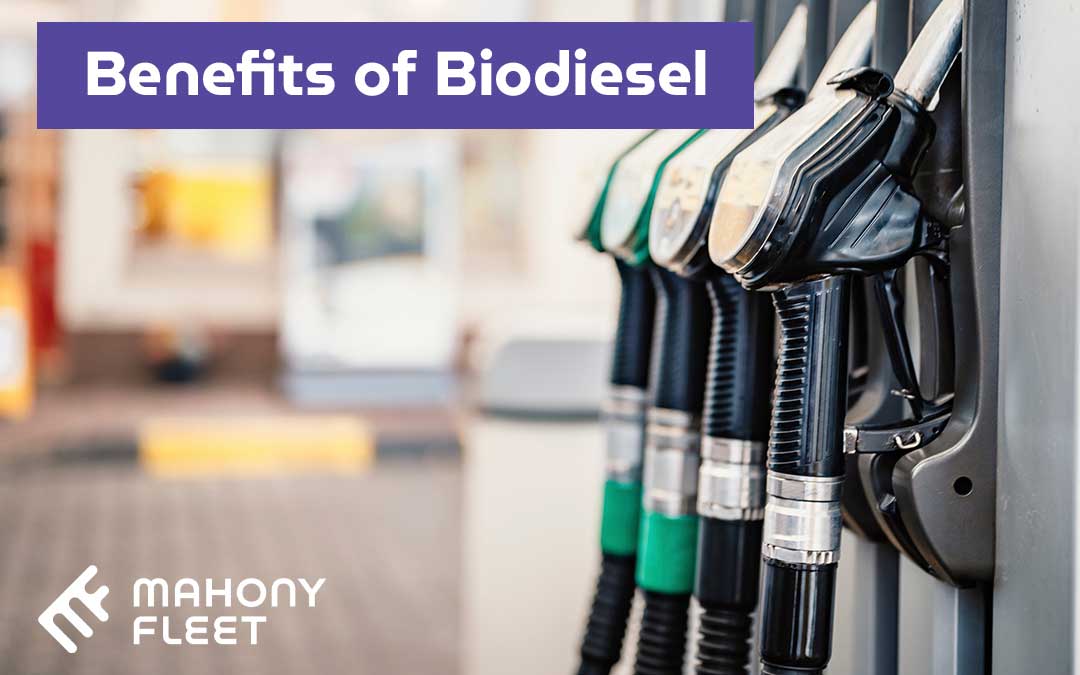Fleet managers are increasingly under pressure to reduce their operations’ carbon footprint. One promising solution is hydrotreated vegetable oil (HVO), a renewable biodiesel.
HVO is an alternative low-carbon biofuel that offers significant environmental and operational advantages.
Here, we look at the benefits of HVO renewable biodiesel for fleet vehicles, highlight its growing availability across Ireland, and explain why fleet managers should consider this renewable diesel for their operations.
What is HVO Renewable Biodiesel?
HVO is a high-quality, fossil-free diesel alternative derived from renewable feedstocks, such as waste cooking oils and fats from the food industry. Unlike other biodiesel, HVO undergoes a hydrotreatment process, which enhances its stability, shelf life, and performance. This makes it chemically identical to conventional diesel but has fewer environmental downsides.
What Vehicles Can Use HVO Biodiesel?
HVO can be used in the majority of diesel engines. That means both van and car fleet vehicles can benefit from lowered CO2 emissions. HVO fuel is also safe to mix with regular diesel at any volume, meaning you don’t have to throw away current supplies.
Most manufacturers have information on their websites about what vehicles are compatible with HVO. Skoda Ireland has a great registration number checker that lets you see if your Skoda vehicle is compatible with HVO. Check it out here.
Environmental Benefits: A Cleaner Alternative
One of the most significant advantages of HVO renewable biodiesel is its potential to dramatically reduce greenhouse gas emissions for fleets. HVO can lower carbon emissions by up to 90% compared to regular diesel, making it a crucial tool in reducing businesses’ carbon footprint.
For fleet managers, switching to HVO is an opportunity to contribute to environmental sustainability and an easy step towards meeting increasingly stringent emissions regulations and reports.
The fuel’s reduced emissions profile helps companies align with corporate social responsibility goals and government mandates, such as Ireland’s target to halve transport carbon emissions by 2030.
With climate change on the agenda for many customers, using HVO can enhance a company’s environmental credentials and appeal to eco-conscious clients.
Engine Longevity and Performance
HVO’s benefits extend beyond environmental impact and offer significant advantages for vehicle engines. Due to its high cetane number, HVO burns more efficiently than traditional diesel, which can improve engine performance and reduce maintenance needs. While HVO can be mixed with diesel at any ratio, for best results, it is recommended to use HVO in a clean tank free from diesel as regular diesel will reduce the benefits of using HVO in the first place..
The fuel’s chemical properties mean it produces fewer deposits in the engine, leading to less wear and tear and longer intervals between servicing. According to industry sources, including Neste, a leading producer of HVO renewable biodiesel, using HVO can improve engine cleanliness and potentially extend the engine’s life.
This is particularly advantageous for fleet managers, who must balance the need for sustainable practices with the economic realities of running a fleet. HVO provides a cost-effective way to achieve sustainability targets by reducing maintenance costs and extending vehicle lifespans.
HVO also has a shelf-life of up to 10-years compared to traditional diesel’s two-year span, making HVO particularly advantageous for use in generators or vehicles that might sit idle for some time.
Circle K’s Expansion of HVO Renewable Biodiesel Availability in Ireland
In Ireland, the availability of HVO is expanding thanks in part to Circle K. As of August 2024, HVO, marketed as milesBIO HVO100, is available nationwide at eight strategically located Circle K service stations. These locations are:
- Circle K Dublin Port, Co. Dublin
- Circle K Junction 8, M8, Cashel, Co. Tipperary
- Circle K Junction 5, M9, Rathcrogue, Co. Carlow
- Circle K Junction 14, M8, Gortore, Fermoy, Co. Cork
- Circle K Express Lifford, Co. Donegal
- Circle K Monaghan, Co. Monaghan
- Circle K City North on the M1
- Circle K Kill South on the M7/N7, Co. Kildare
(Click the links above to see the locations on Google Maps)

These locations are strategically positioned along critical national road routes, making it easier for fleet operators to refuel while on the move. Circle K has committed to further expanding its HVO network, with more locations expected to come online before the end of the year.
Summary
To summarise, Hydrotreated Vegetable Oil (HVO) renewable biodiesel offers fleet managers a compelling combination of environmental, operational, and economic benefits. With up to a 90% reduction in carbon emissions, compatibility with existing diesel engines, and the potential for extended engine life.
As HVO becomes increasingly available at Circle K locations across Ireland, fleet managers have a growing opportunity to adopt this cleaner fuel, contribute to their company’s sustainability goals, and benefit from potential long-term cost savings.
In the broader context of Ireland’s carbon reduction targets, the switch to HVO represents a significant step towards a more sustainable future for the transport sector.




